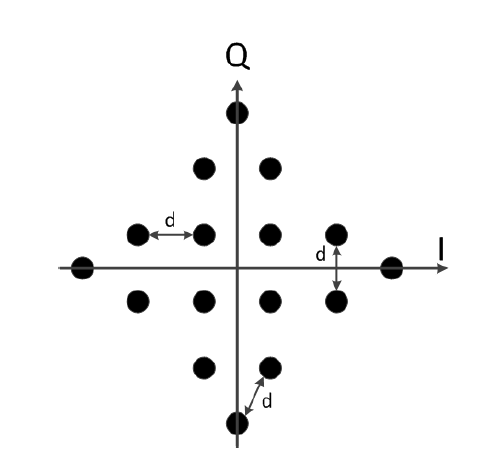How to compute the average energy for the modified 16-QAM constellation below? I know that for regular/rectangular 16-QAM we can utilize the 4-PAM along each axes but I'm not sure how can we find $E_{avg}$ here.
$\begingroup$
$\endgroup$
4
-
$\begingroup$ This is a highly atypical modification of a QAM! This modification actually makes the peak-to-average symbol power ratio worse from a first look at it, so without knowing anything above the constellation I'd say: don't use this. So, wild guess: either this is an exam example, or this isn't used with equally probable symbols. Out of curiosity: Can you give us a bit of background where this is from? $\endgroup$– Marcus MüllerCommented Nov 18, 2018 at 22:06
-
1$\begingroup$ @MarcusMüller It is from a book: Fundamentals of Digital Communication by upamanyu madhow. The figure is from Problem 3.16 but my question is not the question asked in the book. $\endgroup$– LodCommented Nov 19, 2018 at 21:06
-
$\begingroup$ Hey, thanks, @Lod! yeah, they don't put it into great context, it's just "here's the constellation, is it more or less power efficient than regular 16QAM". By the way, you don't have to calculate much to answer that – just notice that you've moved four points farther away from the origin (i.e. increased power) without changing error probabilities much (i.e. did not decrease BER), so the answer is that it's less efficient. $\endgroup$– Marcus MüllerCommented Nov 19, 2018 at 21:10
-
$\begingroup$ @MarcusMüller Yeah I am not much concerned about thier question. I am just trying to study the constellation and how is is different from the regular one. Since you mentioned efficiency, is the bandwidth efficiency the same for both constellation? since it is given by $\eta=log_2 16=4$. I do not know if I am understanding this correctly. $\endgroup$– LodCommented Nov 19, 2018 at 21:15
Add a comment
|
1 Answer
$\begingroup$
$\endgroup$
The procedure is always the same. You need to compute the expectation $E\{|A_k|^2\}$, where $A_k$ are the complex symbols of the constellation:
$$E\{|A_k|^2\}=\sum_kP_k|A_k|^2\tag{1}$$
$P_k$ is the probability that the $k^{th}$ symbol is chosen. Usually you can assume that all symbols are equally likely, i.e., $P_k=1/M$, where $M$ is the number of symbols.

